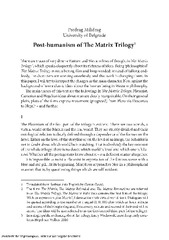Post-humanism of The Matrix Trilogy
Поглавље у монографији (Објављена верзија)
Метаподаци
Приказ свих података о документуАпстракт
There are traces of very diverse Eastern and Western lines of thought in The Matrix
Trilogy2, which speaks eloquently about its richness of ideas. Being ‘philosophical’
The Matrix Trilogy is not a boring film and long-winded; instead of talking endlessly,
the characters are working ceaselessly, and that work is changing them. In
this paper, I will try to interpret the changes in the main character, Neo, against the
background of some classic ideas about the human being in Western philosophy.
The main theses of this text are the following: In The Matrix Trilogy, Platonist,
Cartesian and Hegelian ideas about man are clearly recognizable. On their general
plain, plots of the films express movement (progress?) from Plato via Descartes
to Hegel3 – and further.
Кључне речи:
Hegel / Descartes / Platon / Matrix Trilogy / MarxИзвор:
From Humanism to Meta-, Post- and Transhumanism?, 2016, 307-320Колекције
Институција/група
IFDTTY - CHAP AU - Predrag, Milidrag PY - 2016 UR - http://rifdt.instifdt.bg.ac.rs/123456789/1486 AB - There are traces of very diverse Eastern and Western lines of thought in The Matrix Trilogy2, which speaks eloquently about its richness of ideas. Being ‘philosophical’ The Matrix Trilogy is not a boring film and long-winded; instead of talking endlessly, the characters are working ceaselessly, and that work is changing them. In this paper, I will try to interpret the changes in the main character, Neo, against the background of some classic ideas about the human being in Western philosophy. The main theses of this text are the following: In The Matrix Trilogy, Platonist, Cartesian and Hegelian ideas about man are clearly recognizable. On their general plain, plots of the films express movement (progress?) from Plato via Descartes to Hegel3 – and further. T2 - From Humanism to Meta-, Post- and Transhumanism? T1 - Post-humanism of The Matrix Trilogy SP - 307 EP - 320 UR - https://hdl.handle.net/21.15107/rcub_rifdt_1486 ER -
@inbook{
author = "Predrag, Milidrag",
year = "2016",
abstract = "There are traces of very diverse Eastern and Western lines of thought in The Matrix
Trilogy2, which speaks eloquently about its richness of ideas. Being ‘philosophical’
The Matrix Trilogy is not a boring film and long-winded; instead of talking endlessly,
the characters are working ceaselessly, and that work is changing them. In
this paper, I will try to interpret the changes in the main character, Neo, against the
background of some classic ideas about the human being in Western philosophy.
The main theses of this text are the following: In The Matrix Trilogy, Platonist,
Cartesian and Hegelian ideas about man are clearly recognizable. On their general
plain, plots of the films express movement (progress?) from Plato via Descartes
to Hegel3 – and further.",
journal = "From Humanism to Meta-, Post- and Transhumanism?",
booktitle = "Post-humanism of The Matrix Trilogy",
pages = "307-320",
url = "https://hdl.handle.net/21.15107/rcub_rifdt_1486"
}
Predrag, M.. (2016). Post-humanism of The Matrix Trilogy. in From Humanism to Meta-, Post- and Transhumanism?, 307-320. https://hdl.handle.net/21.15107/rcub_rifdt_1486
Predrag M. Post-humanism of The Matrix Trilogy. in From Humanism to Meta-, Post- and Transhumanism?. 2016;:307-320. https://hdl.handle.net/21.15107/rcub_rifdt_1486 .
Predrag, Milidrag, "Post-humanism of The Matrix Trilogy" in From Humanism to Meta-, Post- and Transhumanism? (2016):307-320, https://hdl.handle.net/21.15107/rcub_rifdt_1486 .


